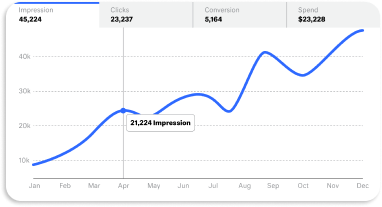
Sustainability Market Trends & Quora Audience Insights

Table of Contents
In response to the rising threat of climate change, individuals and businesses have been exploring sustainable solutions to reverse the trend. There is a conscious move away from the use of fossil fuels towards renewable and alternative energy sources, such as wind energy and solar energy. Governments across the globe are also demonstrating their commitment to encouraging sustainable technology by offering subsidies for the setting up of solar power plants and for the use of solar panels. At the same time, lifestyle changes towards consumption of organic produce and more diligent corporate ESG, aiming for carbon neutrality and better energy efficiency, are catching on.
At various levels, there is growing consciousness about the environment and with respect to dialogues on sustainability, the chorus is only getting louder.
#SustainabilityTrends
Global sustainability market stats & trends
The global green technology and sustainability market is estimated to have been roughly $13.76 billion in 2022 and it is expected to peak to almost $62 billion by 2030, growing at a clipping 20.8%.
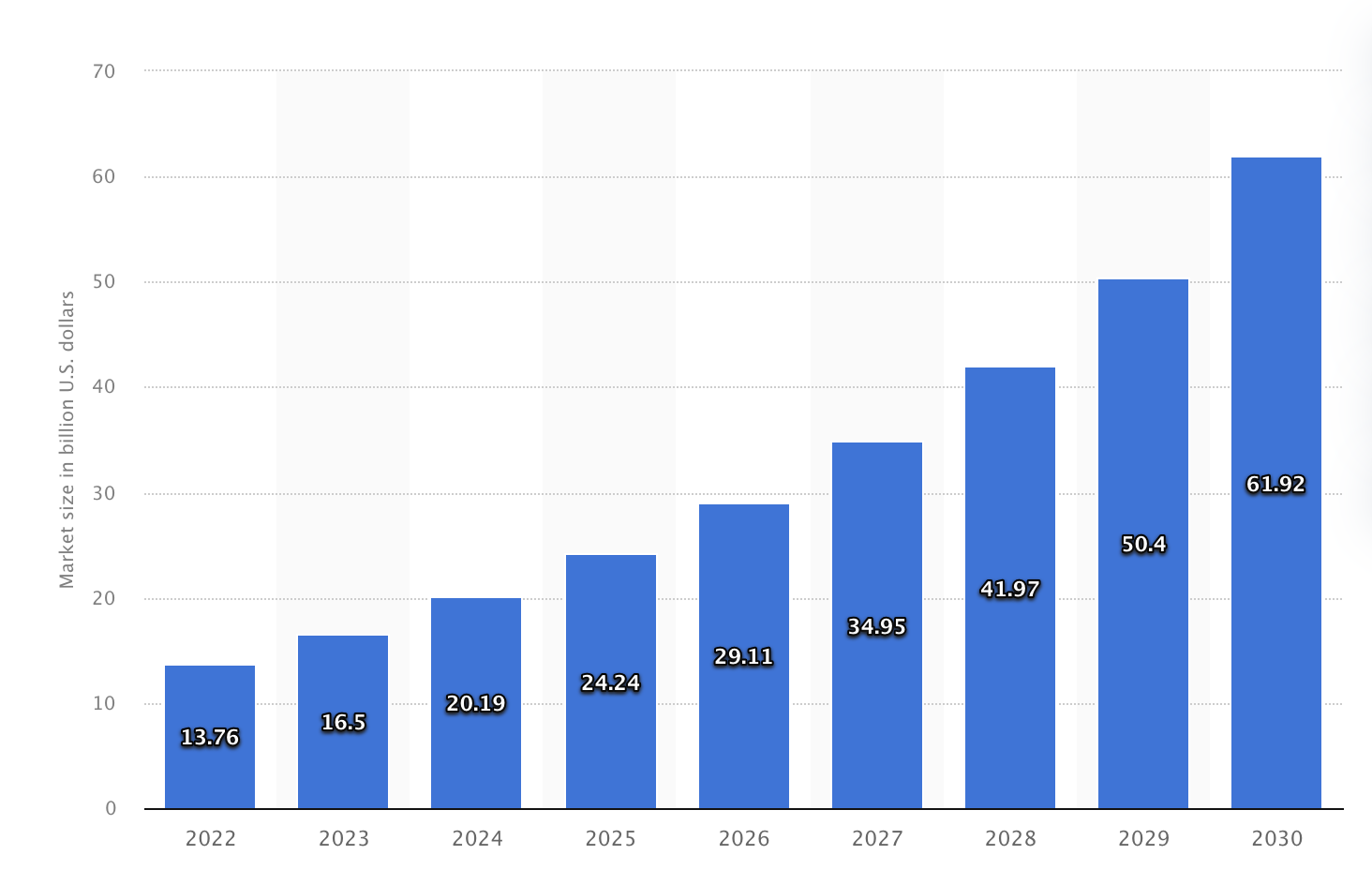
A report by RetailDive (March 2023) observed that sustainability-marketed products remain pricier, with a 27.6% price premium compared to conventionally marketed goods. This number is relatively unchanged from the 2021’s report, when the price premium was 28%.
Nevertheless, and despite high inflation, sustainability-marketed products took more market share in 2022 than in 2021. These products now comprise 17.3% of purchases compared to conventionally marketed products.
The architecture and construction sectors have enormous potential for sustainable innovation, as today’s buildings are responsible for more than 40% of global energy usage. Together, electricity generation, heat production, and transport account for roughly 70% of global greenhouse gas emissions. Renewable energy generation and growth in the solar market will drive progress in this segment.
In addition to renewable energy sources, sustainable packaging has emerged as a key growth area for sustainability, as a growing number of consumers globally indicate they are willing to change their purchasing habits to improve the environment.

85%
of global consumers have become ‘greener’ in their purchasing.

50.1%
of CPG growth from 2013 to 2018 came from sustainability-marketed products, despite only comprising 16% of the market.
#EnvironmentallyAdsMarketing
Environmentally conscious advertising and marketing
In the race to achieve sustainability, advertising is a critical tool to create awareness and drive prompt action towards greener choices. Conscious corporations and marketers have been employing sustainable advertising and marketing. This goes beyond merely promoting products and services to inform and educate customers on the environmental impact of products and services, sometimes for the entire lifecycle of the product.
In the past, sustainability was more likely to be considered as an issue to be addressed by consumers. However, a survey by Deloitte – Deep Dive: Embracing internal sustainability indicates that CMOs are looking increasingly inward, as key to maintaining relevance and profitability. This contrasts with placing the onus of sustainability on the consumer. In fact, only 25% of respondents said they are trying to influence new consumer actions. Instead, brands are increasingly preoccupied with showing concern for the planet and the people they serve. The survey concluded that marketers are recognizing the importance of communicating their commitments to equity and environmental impact as part of building a brand that can stand the test of time.
#SustainabilityAdsMarket
Sustainability advertising market outlook
A global Statista report on sustainability in advertising and marketing found six out of ten people agree that if companies do not act immediately to combat climate change, they will be failing their staff and customers. More than half of consumers said they deemed environmental responsibility fundamental when selecting a brand.
Examining regional trends, the study found:

9 out of 10
European companies plan to boost their sustainable marketing budget to some degree in the next few years.

‘Sustainability’
followed ‘Inflation’ as the second most crucial topic dominating the agenda of European CMOs in 2023.

6 out of 10
consumers in the US believed ad agencies working for fossil fuel brands should be held liable for green-washing and obstructing climate change.

~1 out of 4
Canadian consumers named disrespect for environmental sustainability as a primary advertising-related concern.
The report revealed that sustainability is also a key element for businesses who want to reach a younger audience, with Gen Z consumers being the ones paying the most attention to it when choosing a brand.
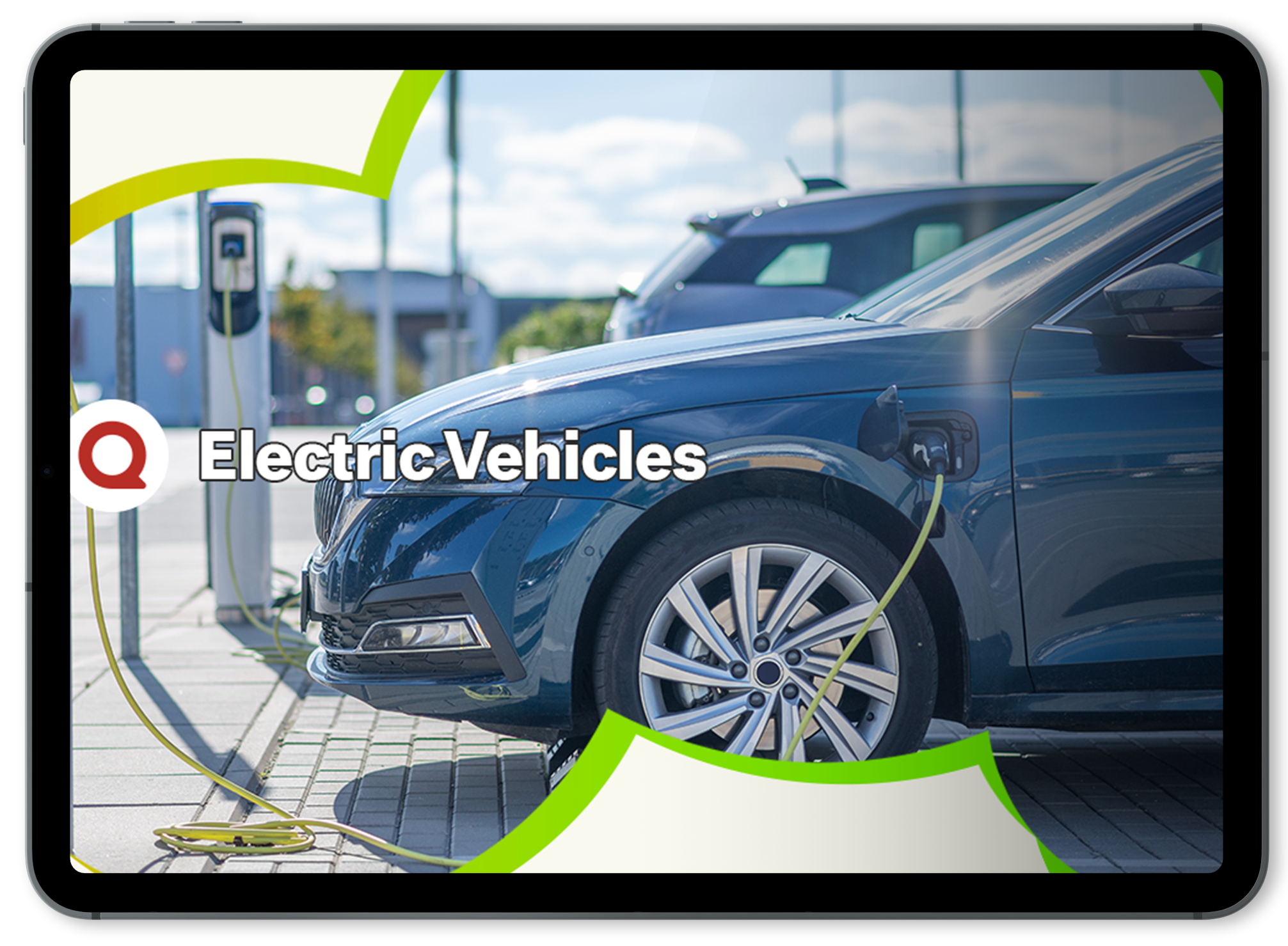
EV Advertising Trends
One of the most popular sustainability topics people discuss on Quora is electric vehicles. Our audience discusses the benefits of different electric mobility solutions, compares models, and learns from one another. Get to know Quora’s global EV audience and how you can get your brand’s message in front of them.
#SustainabilityTrendsExamples
Sustainability marketing – digital trends and examples
Today’s consumers are more informed and conscious about issues such as climate change, resource depletion, and social justice. They expect brands to be transparent, accountable, and actively engaged in sustainable practices. As a result, companies are incorporating sustainability into their advertising and messaging to showcase their commitment to ethical and environmentally responsible practices.
Whether it’s promoting eco-friendly products, highlighting supply chain transparency, or supporting social causes, brands understand that embracing sustainability is not just a competitive advantage but also a moral imperative. By aligning their messaging with consumer values, brands can build trust, strengthen brand loyalty, and contribute to a more sustainable future.
Mindful Digital Marketing consultant, Solene Rauturier, defines sustainable digital marketing as all the ways to sustainably and ethically promote an eco-conscious business online. This encompasses promoting a brand’s sustainable and ethical products or services as well as its eco-friendly practices in a way that is profitable for the company, our planet and its people, in the long run.
Some leading benefits of this approach are:
- Showcasing products, services and processes better and to a wider audience
- Building reputation and brand and improve credibility
- Saving energy, reduce the use of natural resources and carbon footprint
- Differentiating your brand in the cluttered online space
- Sharper targeting of the brand message to audiences
When it comes to creating sustainable digital marketing messages that resonate, below are a few strategies to note:

Authenticity and transparency
Be authentic and transparent in your sustainability efforts. Consumers value honesty and want to see real, tangible actions from brands. Clearly communicate your sustainability initiatives, goals, and progress, and provide evidence to support your claims.

Education and awareness
Use your digital marketing channels to educate and raise awareness about environmental and social issues. Provide valuable content that informs consumers about the impact of their choices and offers practical tips for living more sustainably. This positions your brand as a trusted source of information and demonstrates your commitment to making a positive difference.
Example: Sustainable packaging campaigns can educate consumers about broader benefits such as soil conservation and biodiversity preservation, contributing to the growth of the organic market.

Storytelling and emotional connection
Use storytelling techniques to create an emotional connection with your audience. Share compelling narratives that highlight the positive impact of your sustainability initiatives. People are more likely to engage with and remember stories that resonate with them on an emotional level.

Collaboration and partnerships
Collaborate with like-minded organizations, influencers, and nonprofits to amplify your sustainability message. Partnering with credible entities that share your values can expand your reach, lend credibility to your efforts, and create a sense of community around sustainability.
Example: Solar panel companies can collaborate with local installation companies or contractors to strengthen their advertising efforts. Establishing partnerships that offer exclusive deals or discounts to customers who purchase solar panels through recommended installers can increase credibility and reach within a local market.

User-generated content and advocacy
Encourage user-generated content and empower your audience to become advocates for sustainability. Run campaigns that encourage customers to share their sustainable practices, ideas, or experiences with your brand. This fosters a sense of community, builds trust, and generates authentic content that can be shared across your digital platforms.

Measurable goals and impact reporting
Set measurable goals for your sustainability initiatives and regularly report on your progress. Use key performance indicators (KPIs) to track and communicate the environmental and social impact of your efforts. This demonstrates accountability and allows consumers to see the tangible results of their support.
#SustainabilityAdsonQuora
Sustainability advertising on Quora
Over 400 million monthly unique visitors come to Quora to explore issues, share knowledge, and engage in discussions around a variety of topics—including sustainability. This interest is reflected in our environmentally conscious user base:

68%
would pay more for an eco-friendly product

62%
say that helping the environment is important to them

47%
are interested in environmental issues

56%
want brands to be eco-friendly

53%
want brands to be socially responsible

39%
want brands to support local suppliers
In terms of attitudes towards companies that demonstrate sustainable business practices:

87%
of Quora users say they would buy an expensive technology product over a cheaper alternative if it is energy efficient

85%
of Quora users think more positively about a technology company if they know their products are sustainable

59%
of Quora users think more negatively about a technology company if they know their products are not sustainable
Motivation to purchase electronics (Quora users across the globe)
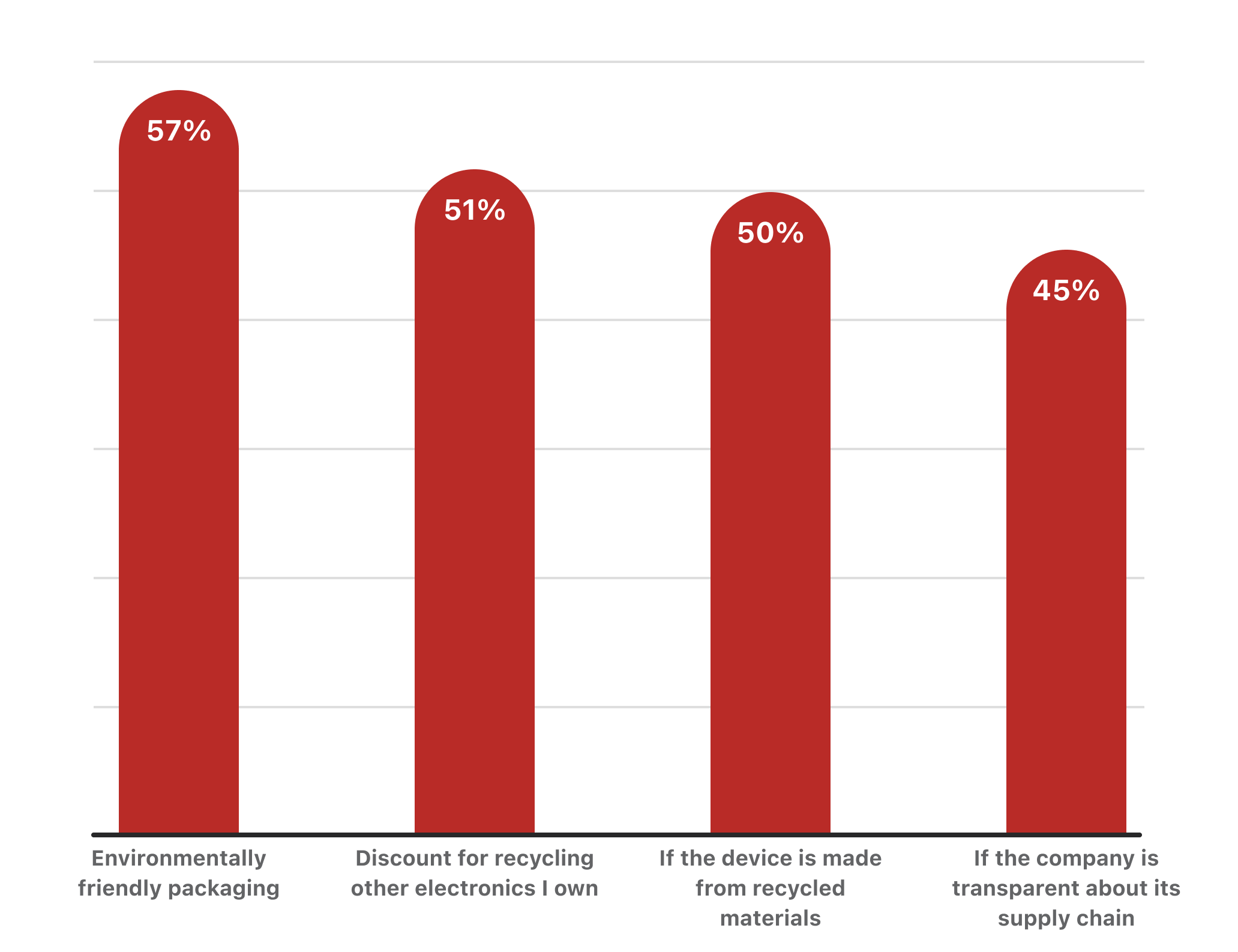
Best practices for effective advertising on Quora
Understand Quora’s audience: Quora users are educated and seek high-quality content. Tailor your strategy to appeal to their curiosity and interest in informative content.
Identify relevant topics and questions: Search for and focus on topics related to your domain. Address questions about benefits, identification, and related aspects.
Craft informative ads: Develop ads that not only promote products but also educate users about your industry or sector, more generally. Highlight production methods and product benefits.
Leverage Quora’s ad targeting: Utilize Quora’s targeting options for specific topics, website visitors, and demographics. Ensure your ads reach the right audience.
Include a clear call-to-action: Incorporate a straightforward call to action, guiding users to visit your website, sign up, or make a purchase.
Monitor campaign performance: Regularly check analytics to understand which ads are performing well and why. Use insights to refine and enhance your campaigns.
Engage with the community: Answer questions within your expertise to establish your brand as a thought leader. Foster community engagement beyond advertisements.
Experiment and optimize: Experiment with diverse ad formats, messaging, and targeting options. Optimize campaigns based on performance data for continual improvement.
Use success stories: Showcase real-life success stories of customers benefiting from organic produce or sustainable packaging. Provide tangible examples for increased credibility.
Targeting and ad formats on Quora
Quora Ads offer various targeting options to enable brands to connect with customers on the platform when they are most receptive.
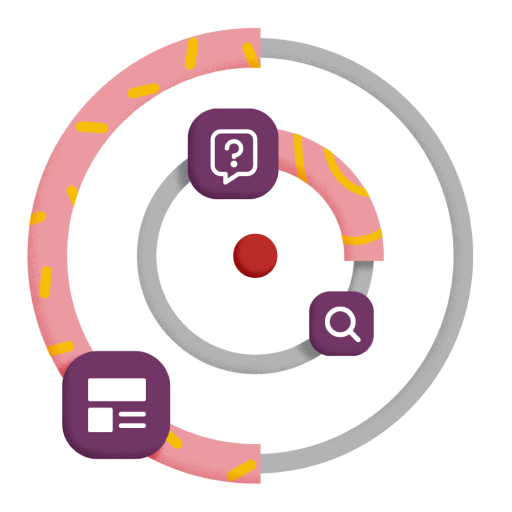 |
Topic Targeting: Position ads alongside questions and feeds tagged with specific topics. Keyword Targeting: Deliver ads next to questions that include your keywords. Question Targeting: Place ads on specific questions and serve tailored messages to a hyper-targeted audience. |
|---|
 |
Website Traffic Targeting: Reconnect with customers who visit Quora after visiting your website.
List Match Targeting: Make the most from your email list; target leads, exclude existing customers, or build Lookalikes. Lookalike Targeting: Scale your existing audiences by finding users similar to your website visitors or email lists. |
|---|
 |
Interest Targeting: Deliver ads to users who engaged with specific content on Quora. Keyword History Targeting: Send your message to users who read questions with your specified keywords. Question History Targeting: “Follow up” with potential customers by delivering ads to users who read specific questions about your products, industry, or competitors. |
|---|
 |
Broad Targeting: Deliver ads to the largest possible audience on Quora. Auto-targeting: Quora’s machine learning system will automatically determine the best targeting configuration to optimize for efficiency and performance over time.
|
|---|
Get your brand’s message in front of over 400 million monthly unique visitors on Quora.
Quora’s global sustainability audience stats
#SustainabilityUS
US
Quora users show high intent when it comes to eco-friendly products.

53%
would pay more for an eco-friendly product

53%
say helping the environment is important to them

54%
more likely to purchase a product after knowing the product or company is environmentally friendly

43%
are interested in environmental issues

47%
want brands to be eco-friendly

38%
want brands to support local suppliers

77%
say they would buy an expensive technology product over a cheaper alternative if it is energy efficient

70%
think more positively about a technology company if they know their products are sustainable

30%
think more negatively about a technology company if they know their products are not sustainable
Motivation to purchase electronics (Quora users in the US)
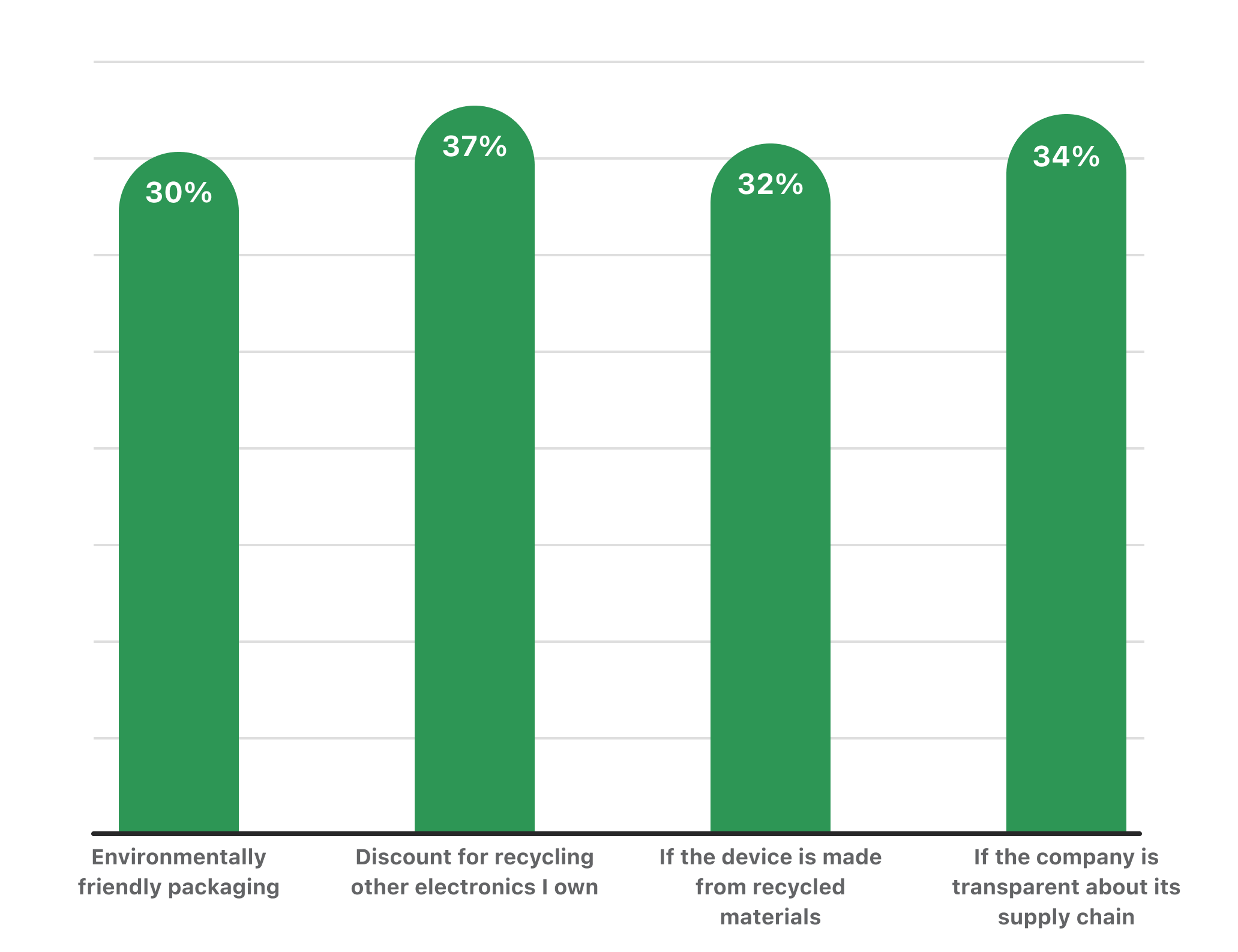
Popular sustainability questions on Quora in the US
Get your brand’s message in front of 147 million monthly unique visitors on Quora in the US.
![]()
#SustainabilityEU
Europe
Quora users in Europe lean towards eco-friendly products.

55%
would pay more for an eco-friendly product

54%
say helping the environment is important to them

55%
more likely to purchase a product after knowing the product or company is environmentally friendly

43%
are interested in environmental issues

48%
want brands to be eco-friendly

36%
want brands to support local suppliers

70%
say they would buy an expensive technology product over a cheaper alternative if it is energy efficient

67%
think more positively about a technology company if they know their products are sustainable

57%
think more negatively about a technology company if they know their products are not sustainable

Popular sustainability questions on Quora in Europe
Get your brand’s message in front of 48 million monthly unique visitors on Quora in Europe & the UK.
![]()
APAC
#SustainabilityIndia
India
A majority of Quora users in India are driven by green intent.

73%
would pay more for an eco-friendly product

69%
say helping the environment is important to them

49%
more likely to purchase a product after knowing the product or company is environmentally friendly

53%
are interested in environmental issues

63%
want brands to be eco-friendly

56%
want brands to be socially responsible

88%
say they would buy an expensive technology product over a cheaper alternative if it is energy efficient

87%
think more positively about a technology company if they know their products are sustainable

62%
think more negatively about a technology company if they know their products are not sustainable
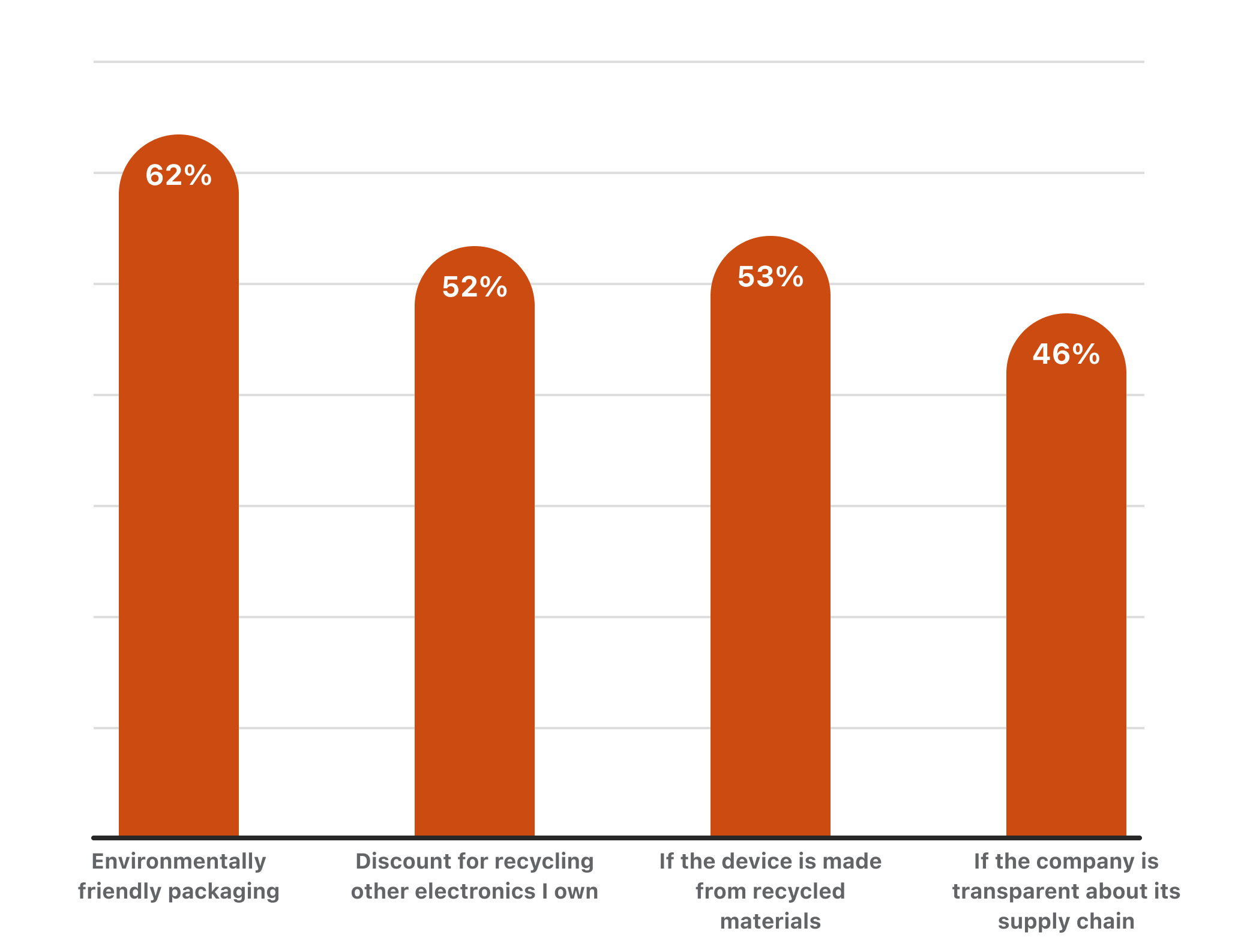
Popular sustainability questions on Quora in India
Get your brand’s message in front of 100 million monthly unique visitors on Quora in India.
![]()
#SustainabilitySEA
Southeast Asia
Quora users in Southeast Asia consider sustainability a priority.

75%
would pay more for an eco-friendly product

64%
say helping the environment is important to them

42%
more likely to purchase a product after knowing the product or company is environmentally friendly

51%
are interested in environmental issues

68%
want brands to be eco-friendly

61%
want brands to be socially responsible

78%
say they would buy an expensive technology product over a cheaper alternative if it is energy efficient

83%
think more positively about a technology company if they know their products are sustainable

57%
think more negatively about a technology company if they know their products are not sustainable
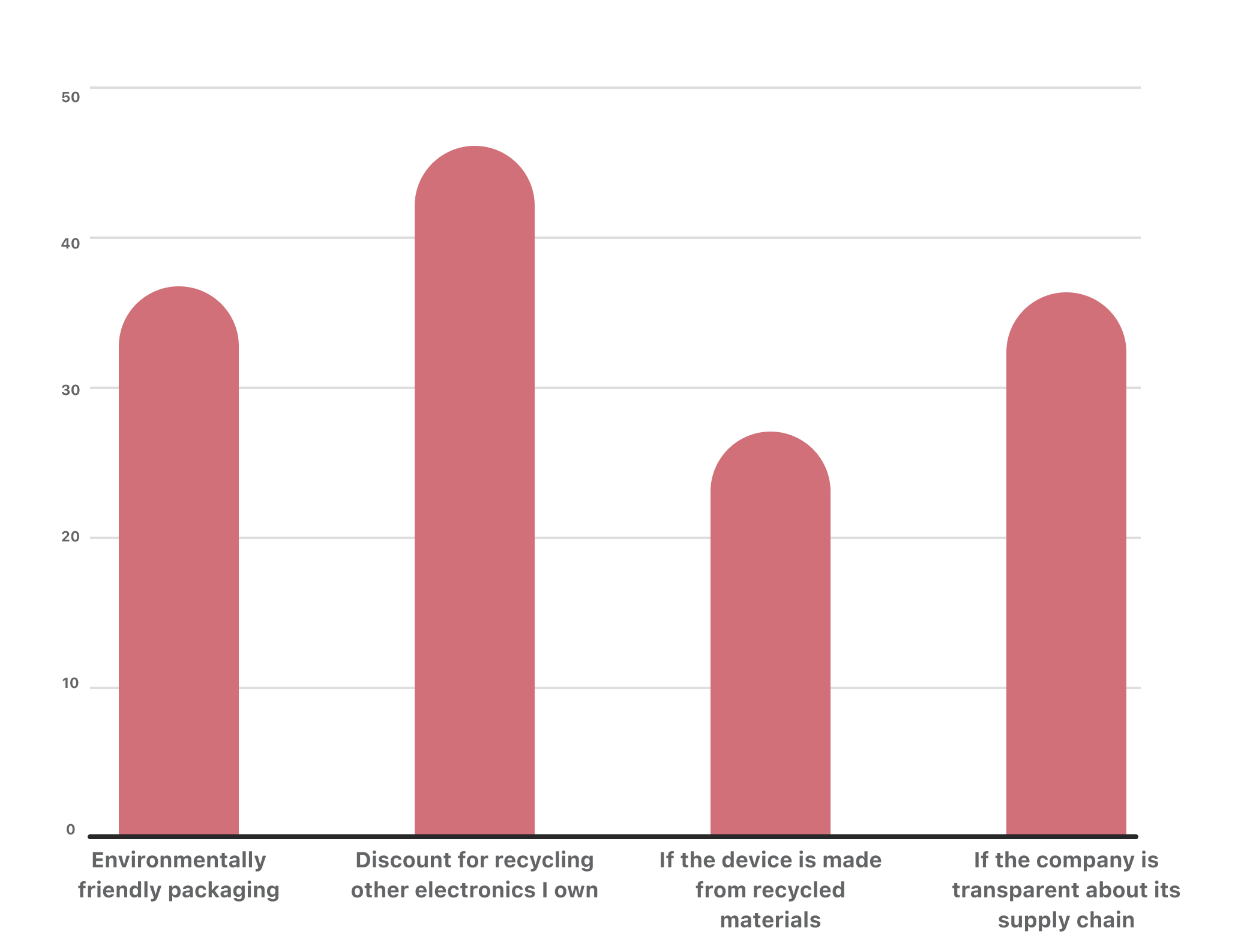
Popular sustainability questions on Quora in Southeast Asia
Get your brand’s message in front of 29 million monthly unique visitors on Quora in Southeast Asia.
![]()
#SustainabilityANZ
Australia & New Zealand
Quora users in Australia & New Zealand shared their preference for eco-friendly products.

54%
would pay more for an eco-friendly product

54%
say helping the environment is important to them

51%
more likely to purchase a product after knowing the product or company is environmentally friendly

46%
are interested in environmental issues

47%
want brands to be eco-friendly

57%
want brands to be socially responsible

67%
say they would buy an expensive technology product over a cheaper alternative if it is energy efficient

77%
think more positively about a technology company if they know their products are sustainable

59%
think more negatively about a technology company if they know their products are not sustainable
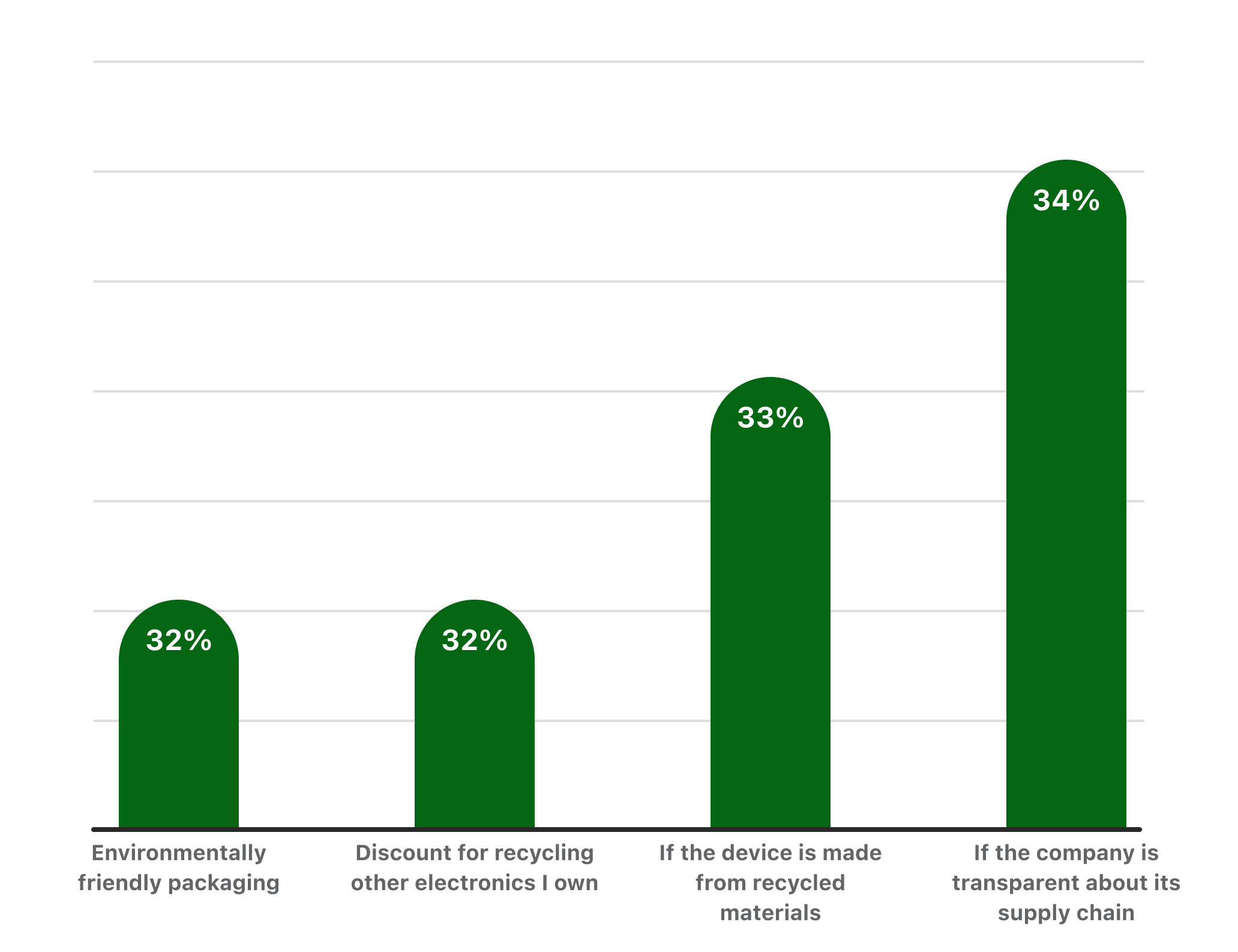
Popular sustainability questions on Quora in Australia & New Zealand
Get your brand’s message in front of 12 million monthly unique visitors on Quora in Australia & New Zealand.
![]()
#SustainabilityMEA
Middle East
Sustainability is a priority for Quora users in the Middle East.

61%
would pay more for an eco-friendly product

56%
say helping the environment is important to them

28%
more likely to purchase a product after knowing the product or company is environmentally friendly

39%
are interested in environmental issues

50%
want brands to be eco-friendly

49%
want brands to be socially responsible
Popular sustainability questions on Quora in the Middle East
Get your brand’s message in front of 10 million monthly unique visitors on Quora in the Middle East.
![]()
Plant the seeds of success with Quora Ads: Cultivate your green business today
The current window of opportunity within the sustainability industry is wide open, and the time to act is now. With Quora offering specialized advertising tools and access to a highly engaged audience interested in sustainable solutions, there’s no better moment to engage, educate, and connect with potential customers who are passionate about sustainability.
Related Content

Industry Insights
Beauty Advertising

Industry Insights

Industry Insights

Industry Insights

Industry Insights

Seasonal Insights
Book a consultation with a Quora expert
![]()
